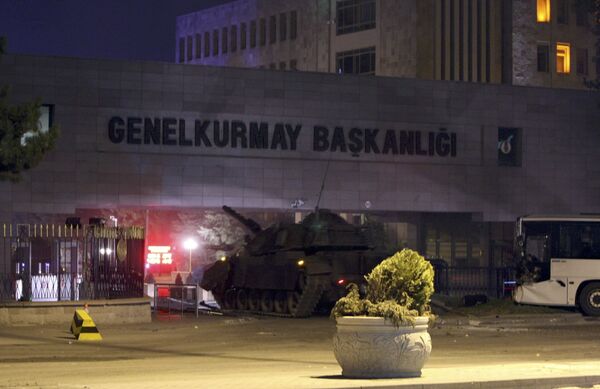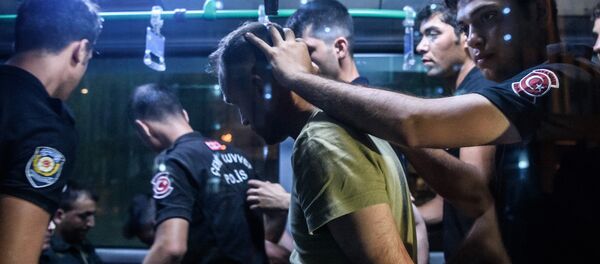His remarks came after Turkish authorities said late last week that an attempted military coup had taken place in the country, which they blamed on a group led by Islamic cleric Fethullah Gulen, who currently lives in self-imposed exile in the United States.
"It was a revolt, not a coup, and its strategy was aimed at failure. People were forced to take to the streets, including 90 percent of those supporting the AKP [the Justice and Development Party]. It was a rehearsal of the civil war which could be unleashed if the AKP supporters clashed with their opponents," he said.
He added that "it was a scenario that was tested in Egypt and Iraq, and that Turkey was lucky in this respect."

According to Mutercimler, the military's attempt to seize power was solely aimed at paving the ground for Gulen becoming a caliph. Mutercimler urged Turkish authorities to deal with a number of pressing issues so that the country can ride out of the chaos.
"It's necessary to elaborate a new foreign policy strategy, including a policy on the the Middle East, defend democracy, stick to democratic principles in political parties, and abandon the autonomy and self-government-related rhetoric," he said.
Separately, he pointed the finger at NATO for its attempts to strengthen the Gulen group.
"The Turkish army remains part of NATO, with the Pentagon and Brussels making strategic decisions. They are unwilling to see our officers supporting left-wing and socialist parties," he said.
He also accused the former chief of the General Staff of the Turkish Armed Forces Necdet Ozel of nominating Gulen supporters for posts in the Turkish Intelligence Organization.
"Look at all the advisers and personal secretaries of the Turkish Air Force and Navy commanders. They are all members of a terrorist organization headed by Fethullah Gulen. The command did not know about them because there were lots of Gullen supporters at the Turkish Intelligence Organization," Mutercimler said.
Earlier this week, the Turkish government formally submitted paperwork calling for the extradition of Gulen.
#Gulen unfazed by #Turkey extradition request, tells me won't get much attention in US bc not legally sound pic.twitter.com/JbBki1X9AY
— Barbara Plett (@BBCBarbaraPlett) 19 июля 2016 г.
The request followed a discussion between US President Barack Obama and his Turkish counterpart Recep Tayyip Erodgan, in which Obama offered his assistance to Erdogan in investigating the attempted coup, but urged the Turkish leader to soften his stance against opposition figures.
In the wake of the attempted coup, Turkish authorities have conducted an unprecedented crackdown on individuals believed to be involved, including governors, prosecutors, intelligence officers, judges, and military personnel.
The United States granted Gulen lawful permanent residency in 2001. Gulen has repeatedly denied any involvement in the coup attempt and condemned the move, saying that it violated democratic principles.




